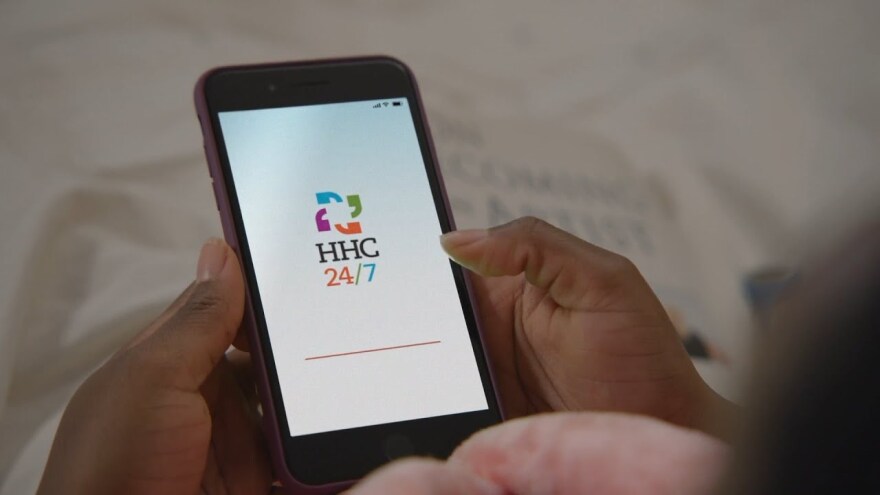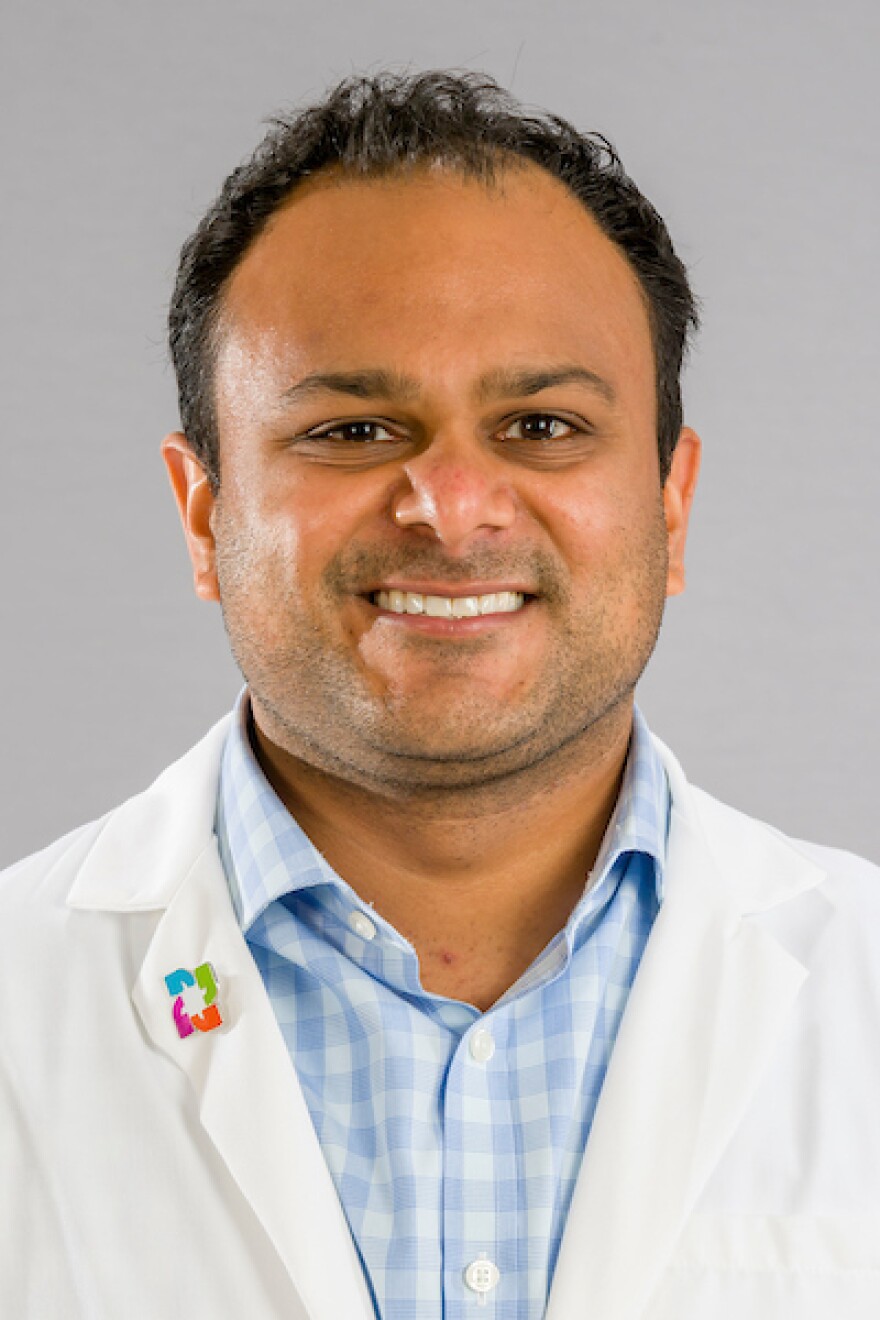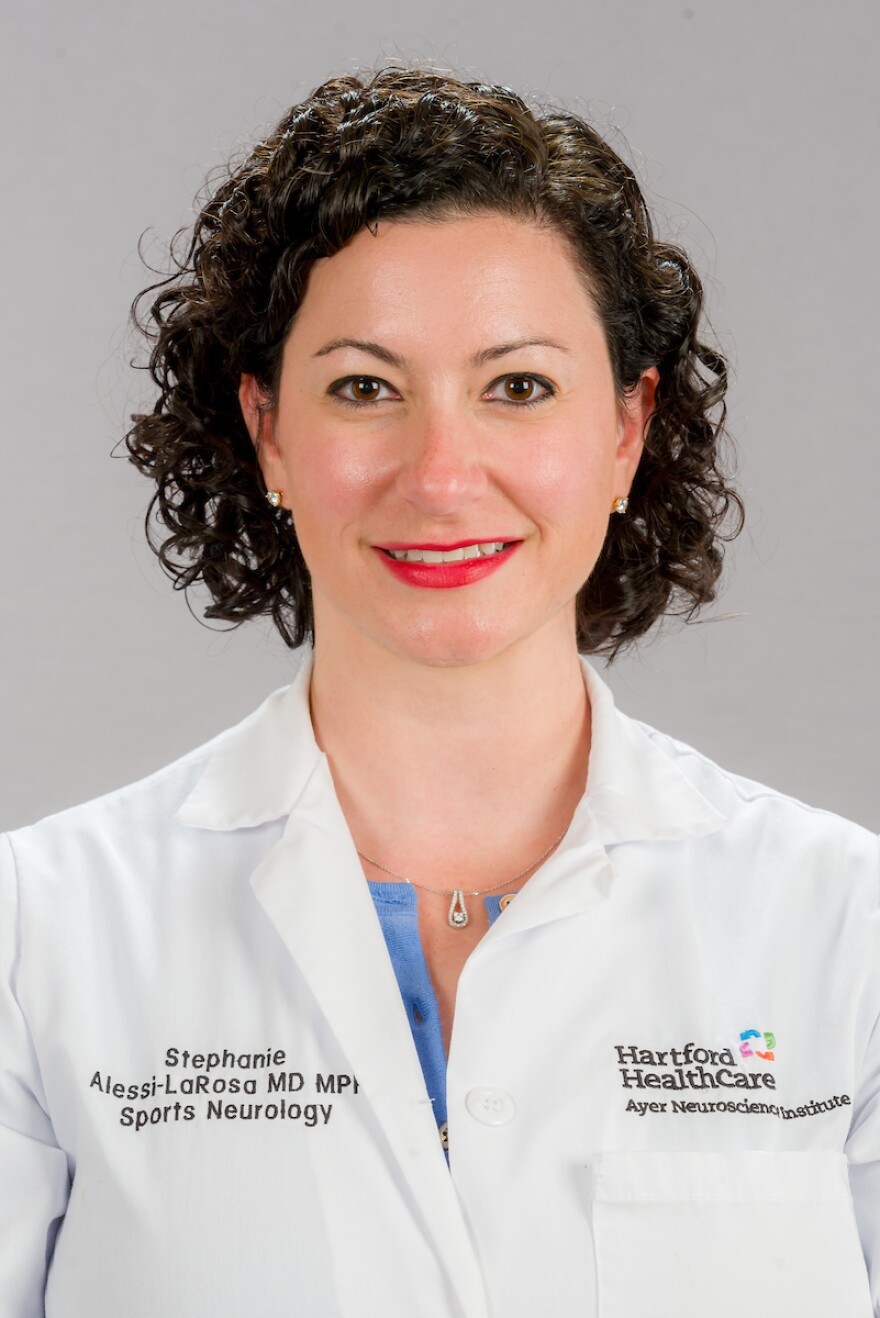Elevating Health
Elevating Health is a series of 1-minute informational segments about health topics that matter to you and your family. Tune in to Connecticut Public Radio weekday afternoons to learn about important medical advances, new procedures, and ground-breaking treatments to help you get well and stay well. Elevating Health is funded by Hartford HealthCare.
Hartford HealthCare offers a wide array of FREE, virtual classes, webinars and support groups that you can join from the convenience and privacy of your home. For more information: HartfordHealthCare.org/VirtualClasses

Hartford HealthCare HHC 24/7 App
Hartford HealthCare’s HHC 24/7 is a next-generation virtual care platform that provides continuous access to primary and acute care. The service combines virtual visits with concierge support and care coordination to ensure continuity, even when in-person evaluation or specialty referral is needed.
Learn more and download the app
Key Features & Benefits
- 24/7 Virtual Access — Patients can schedule or initiate visits at any hour, anywhere, for acute illness, routine concerns, or follow-up care.
- Dedicated Care Team — Each patient is paired with a provider who becomes a longitudinal partner, familiar with their medical history and long-term health goals.
- Seamless Integration — The platform is built to coordinate with Hartford HealthCare’s broader network. If an in-person exam, imaging, or specialist referral is required, transitions are smooth and data flows securely.
- Comprehensive Services — From acute illnesses to chronic disease management, medication oversight, and wellness check-ins, HHC 24/7 supports a wide spectrum of health needs.
- Insurance Friendly — Most major insurance plans accepted by Hartford HealthCare Medical Group are eligible for coverage through HHC 24/7 (including Aetna, Cigna, United Healthcare, Anthem, Medicare, and more).

Treating spine pain with Dr. Heeren Makanji
Dr. Heeren Makanji is an orthopedic spine surgeon and director of research at Hartford HealthCare's Bone & Joint Institute. He explains that advances in spine surgery, including nerve blocks to limit narcotic usage post-surgery, have significantly improved outcomes and recovery.
The Bone & Joint Institute gives patients more access to leading-edge technologies like precision Mako Robotic-Arm Assisted Surgery, hip resurfacing, a special Fragility Fracture Program and new approaches in anesthesia to get you up and moving more quickly.
Related articles
How This Spine-Surgery Patient Avoided Pain Meds
4 Signs It’s Time to See a Doctor for Your Back Pain

Transnasal Skull Base Surgery with Dr. Belachew Tessema
The surgical treatment of skull base disorders is complex in that blood vessels, nerves, and other structures pass through this region. Historically, surgery for these disorders required an open technique. Although an open technique may be required in some instances, our neurosurgery and ENT surgical team has extensive experience in the latest minimally invasive techniques.
Dr. Belachew Tessema, associate director of the Hartford Hospital Ayer Neurosciences Institute, says transnasal skull base surgery is a much less invasive approach to treating tumors with less pain and faster recovery. “This is truly a team-based program,” he explains. “These are complex tumors which necessitate a coordinated treatment plan.”
Learn more
Ayer Neuroscience Institute Skull Base Program

Treating Angina and ANOCA with Dr. Stephanie Saucier
Stephanie Saucier, MD, is a cardiologist an director of Hartford HealthCare’s Women’s Heart & Wellness program.
The cause of microvascular angina is not fully understood, but it is thought that the very tiny blood vessels supplying the heart (microcirculation) have decreased ability to regulate blood flow resulting in symptoms of angina.
Most patients with microvascular angina have recurrent chest pain that typically lasts longer than typical angina (often more than 20 minutes) and is often triggered by physical or emotional stress.
Microvascular angina can also produce:
- Shortness of breath
- Fatigue
- Sleep problems
- Pain or discomfort in jaw, neck, back, abdomen or arm
Learn more about diagnosis and treatment options

New Approach to Treating Psychosis with Dr. Craig Allen
J. Craig Allen, MD, is chief medical Officer at Rushford, a leader in providing addiction and mental health services.
First-episode psychosis is very traumatic to a person’s brain and should be treated like other traumas to the body such as heart attack. According to Dr. Allen, a second episode can start a downward trend. This new approach with long-acting injectables can significantly increase adherence compared to oral medication and reduce subsequent episodes and greatly improve quality of life.
Related article:
What Happens After Experiencing Psychosis for the First Time?
Learn more about treatment:
Hartford HealthCare Behavioral Health Services

Beyond your BMI with Dr. Pavlos Papasavas
Pavlos Papasavas, MD, is a bariatric surgeon and director of research with Hartford Hospital.
A recent publication by a team of international scientists proposes we divide clinical obesity into two categories – clinical obesity and pre-clinical obesity. “Clinical obesity is a chronic disease of excess fat that causes disfunction of organs,” explains Papasavas. “This presents a risk of developing severe complications such as heart attack or stroke.”
While Body Mass Index, or BMI, has been used as an indicator for obesity for decades, Dr. Papasavas says we now how more tools and treatments available to more accurately diagnose and treat both pre-clinical and clinical obesity.
Related Article:
9 Ways to Gauge Your Health – Besides BMI
Learn more:
Medical and surgical weight loss options

Hartford HealthCare Partners with Memorial Sloan Kettering Cancer Center
In a groundbreaking development that stands to transform the delivery of cancer care in Connecticut, the Hartford HealthCare Cancer Institute at St. Vincent’s Medical Center has been designated as the first Care Partner of Memorial Sloan Kettering Cancer Center (MSK) in the United States. This achievement reflects the completion of an extensive review process by MSK to ensure that all oncology care at the Hartford HealthCare Institute at St. Vincent’s Medical Center meets MSK Standards of Care™.
This enhanced partnership is built upon the 10-year collaboration in which the Hartford HealthCare Cancer Institute became the first member of the Memorial Sloan Kettering Cancer Alliance.

Pelvic Organ Prolapse with Dr. Elizabeth Sappenfield
Pelvic organ prolapse affects millions of women and can often go undiagnosed. Elizabeth Sappenfield, MD, a urogynecologist with Hartford Hospital, says knowing the symptoms of this condition can be severe.
“The organs in the pelvis shift from their normal position and can feel like a bulge or something falling out,” she explains. Symptoms can include:
- Feeling of a bulge or something coming down the vagina
- Discomfort during sex.
- Problems urinating or not emptying your bladder fully.
“It is important for women to talk to a urogynecologist if they are bothered by any of these symptoms,” explains Dr. Sappenfield. “There is no reason, women should have to feel anxious or self-conscious about this very common problem, especially because there are many solutions to help address these issues.”
Read more
Simple Solutions for Urinary Incontinence Among Women
Learn more
Urogynecology at the Tallwood Institute

Mitral Valve Repair with Dr. Sabet Hashim
The Hartford HealthCare Heart & Vascular Institute, a national leader in cardiovascular disease prevention, treatment, surgery and research, cares for more patients and performs more advanced cardiac procedures than any other cardiac program in Connecticut with doctors using the most innovative technology available to provide the very best, personalized care for patients.
Read more:
Heart & Vascular Institute Named Mitral Valve Repair Reference Center by American Heart Association

New Parkinson’s Drug with Dr. Toni DiMarcaida
At the Chase Family Movement Disorders Center, we are experts in the treatment of Parkinson’s disease. The program is one of the first Comprehensive Care Centers designated by the Parkinson’s Foundation’s prestigious Global Care Network. As part of this network, our clinicians can work with colleagues from other highly regarded institutions to advance patient care and improve the quality of life for people with Parkinson’s disease.
Read more:
Chase Family Movement Disorders Center 1 of Only 15 Globally to Receive Parkinson’s Designation
Identifying These Early Signs of Parkinson’s Can Lead to Better Outcomes

New Lung Screening Guidelines with Dr. Justin Van Backer
Lung screening is important for several reasons, primarily related to early detection and prevention of lung-related diseases, especially lung cancer.
Detection of Other Lung Conditions: Lung screening may also detect other lung-related conditions besides lung cancer, such as chronic obstructive pulmonary disease (COPD) and pulmonary nodules. Early detection of these conditions can lead to timely management and better health outcomes.
J. Tyler Van Backer, MD, thoracic surgeon with the Hartford HealthCare Cancer Institute at The Hospital of Central Connecticut, answers four common questions about lung cancer screenings.
Read more: 4 Common Questions About Lung Cancer Screenings

Osteoporosis – Chris Barrett
Christopher Barrett, MS, RD, CSCS, is a registered dietitian and nutritionist with Hartford HealthCare’s Bone & Joint Institute.
In addition to remaining on the Vitamin D dosage prescribed by their provider, Barrett says people with osteoporosis can improve their bond strength in several ways, including following a well-balanced exercise program that includes resistance training or lifting weights.
“Here at the Bone and Joint Institute, we have a class for people over 60 to help them combat osteoporosis and sarcopenia, or muscle loss, as they age,” he said.
Add natural sources of protein and micronutrients like magnesium and Vitamin K to your diet.
“This is where working with a registered dietitian can support individuals with osteoporosis and maximize their overall dietary intake,” Barrett said.
Related articles:
Are You at Risk of Osteoporosis? This Test Shows if You’re Susceptible to a Fracture
How Bone-Building in Youth and Your Diet Can Help Prevent Osteoporosis

Young Athletes and Brain Health – Dr. Stephanie Alessi-LaRosa
Stephanie Alessi-LaRosa, MD, is a sports neurologist and the director of Hartford Healthcare’s Sports Neurology Program. On the Hartford HealthCare team, she is responsible for providing advanced care for athletes with sports-related neurologic injuries and conditions. Her areas of clinical interest include concussion, post-concussion syndrome and migraines/headaches.
Student athletes and weekend warriors alike all enjoy what they do, whether it's in the pool, on the court, or in the saddle. If they’re hurt while playing – or have a neurologic condition that might make it challenging to compete – they can find help at the Ayer Neuroscience Institute Sports Neurology Program.
The program, one of the few in the country, is led by Connecticut’s only neurologist with advanced training in sports neurology, Dr. Stephanie Alessi-LaRosa. Her patient-focused work, which includes collaboration with other specialists, has one goal: Restoring the athletes to health and helping them return to their sport as quickly and safely as possible.
Related articles:
Why an Athlete Might Now See a Sports Neurologist
What is Post-Concussion Syndrome?
